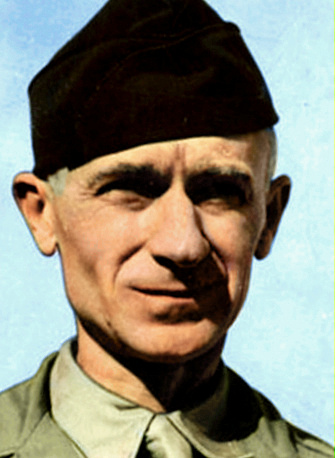Background of news –
League vote 25 years ago
By Buel W. Patch
…
Discarded measure pops up once more
By Marshal McNeil, Scripps-Howard staff writer
…

By Ernie Pyle
IN THE WESTERN PACIFIC (delayed) – We were launching our midmorning patrol flight. The sun was out bright, and the day warmly magnificent. Everything was serene.
I already had become acquainted with some of the pilots, and before each flight I would go to the “ready room” and find out from the blackboard the numbers of planes my friends were flying, so I could identify them as they went past.
Lt. Jimmy Van Fleet is one of the pilots I know best. We got acquainted because we have a mutual friend – war correspondent Chris Cunningham, with whom I shared a tent and sometimes worse through Tunisia and Italy. Jimmy and Chris are from the same hometown – Findlay, Ohio.
We knew the very moment he started that Jimmy was in trouble. His plane veered sharply to the right, and a big puff of white smoke spurted from his right brake band. Then slowly the plane turned and angled to the left as it gained speed.
Sensed trouble
The air officer up in the “island” sensed catastrophe, and put his hand on the warning squawker. All the sailors standing on the catwalk, with their heads sticking up over the edge of the flight deck, quickly ducked down. Yet such is the rigidity of excitement, I never even heard the squawker.
It was obvious Jimmy couldn’t stop his plane from going to the left. He had his right wheel locked, and the tire was leaving burned rubber on the deck, yet it wouldn’t turn the plane. And it was too late for him to stop now.
His wheels raked the anti-aircraft guns as he went over, his propeller missed men’s heads by inches, his left wing dropped, and in a flash, he disappeared over the side.
When the plane again came into view, only the tail was sticking out of the water. And then Jimmy bobbed up beside it. he had gotten out in a few seconds.
When he got back to us, Jimmy told me what happened from there on. He said that when the plane went in the water, it went so deep that it got dark in the cockpit. Jimmy wasn’t hurt by the crash, outside of a small cut on his forehead.
He pulled his various buckles, opening his hatch cover and releasing himself from his seat harness. But as he did so he fell forward (the plane was riding nose down in the water, of course) and in a moment was standing on his head, under water, and in a hell of a fix.
Cut radio cord
But somehow, he got himself upright, and then he couldn’t get out because his radio cord, attached to his helmet, was still plugged into its socket back of his seat.
So, he took his big sheath knife out of its holder, cut the radio cord, and then carefully put the knife back. He says he doesn’t know why he put it back. All this happened under water, and in mere seconds.
Some part of Jimmy’s clothing caught as he was getting out, and he gave a big yank to free himself. Thus, he tore his Mae West wide open, both compartments of it, and he had no buoyancy at all. But he is an excellent swimmer, so he stayed up.
Lucky again
When Jimmy went over the side, a destroyer was running about a mile to our left. Here Jimmy was lucky again. For that wasn’t the destroyer’s normal position; it just happened to be cutting across the convoy to deliver some mail on the other side.
Jimmy had hardly hit the water when we saw the destroyer heel over in a swath-cutting turn. They had been watching the takeoffs through their glasses, and had seen him go over. Our own ship, of course, had to keep right on going straight ahead. And our next plane took off without the slightest wait, as though nothing had happened.
The destroyer had Jimmy aboard in just seven seconds. They didn’t put over a boat for him, but instead sent a swimmer out after him, with a line tied around his waist.
He got to Jimmy just in time. Jimmy passed out in his arms. With no lifebelt, he had taken too much salt water aboard.
In the meantime, the destroyer had let down a metal stretcher, and another swimmer was there to help get Jimmy into it. it took a while for them to get him on, for he was dead weight, and the stretcher kept going up and down with the waves.
But finally they managed it. Jimmy was safe and alive, although a very water-laden and passed out young man from Ohio.
Workers for big meatpacking company gets 52 checks a year, plus bonuses
By Allan A. Swim, Scripps-Howard staff writer
…
By Gracie Allen
Well, spring arrives this afternoon at 4:38 p.m. Pacific War Time.
Personally, I always thought it came on March 21, but in our home almanac on farmers’ complaints, it’s a day early this year. Well, I guess we’re all having troubles with our transportation schedules this year.
I never understood exactly when spring arrives but, according to the almanac, it’s here, and days and nights are getting nearer to being equal. That is, they were getting nearer before the midnight curfew order, but a lot of people are finding out nights are much longer, no matter where the sun is.
So now it’s spring and in Washington Mrs. Roosevelt is wistfully looking over her travel folders, and Clare Boothe Luce starts making up new words.
In Germany, the tourist season is in full swing, and the vultures are getting ready to fly South. In Japan, the groundhog has appeared, but the rest of the nation is busy going underground.
Bomber crewmen fear nothing
By Ruth Millett
…
‘Osty,’ Dahlgren also on way to join squad – game called off
By Chester L. Smith, Press sports editor
…

Ladies and gentlemen:
There was a time when you and I gave to the Red Cross largely in a feeling of aid to others. That was a giving in humanity and in decency. This year we give as well in necessity – necessity for our own. The need never was greater. And it will not soon be less.
As your President, I have never indulged myself or the American people in the pastime of predicting the advent of peace. I do not know when victory will come. I do know it will come, and I do know that tonight there are over seven and a half million Americans overseas or fighting afloat in this great war. I know that there are nearly seventy thousand Americans in prison camps of the enemy. And I know that there is nothing unpredictable about their needs.
We can be proud of all that the Red Cross has meant to them. From personal observation abroad, I can testify to the usefulness of the Red Cross in the battle zones.
It has reached through the barbed wire of enemy prison camps with millions of parcels of food, and clothing, and medical supplies.
It has collected for the Army and Navy vast quantities of precious blood plasma, which has saved thousands of American lives.
It has supplied refreshment and entertainment and good cheer. It has served as a link between the fighting man and his loved ones here at home.
Never, in the annals of voluntary service to humanity, has an agency performed so many tasks so well.
And this is no call for charity. This is our chance to serve those who serve us.
As their Commander-in-Chief, I call upon you, my fellow Americans, to oversubscribe the 1945 Red Cross War Fund. We cannot give too much to those who have given us the heroic hazard of their lives.